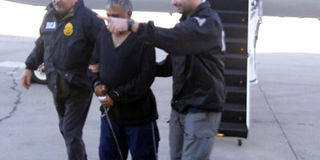Lawyers: Akashas should not stand trial in US

One of the Akasha brothers arrives at a US airport from Kenya in January 2017. PHOTO | FILE | AGENCIES
What you need to know:
Christopher Cassar, an attorney for Baktash Akasha, argues the case should not go to trial because "this court lacks jurisdiction over the defendant".
- Dawn Cardi, an attorney for Ibrahim Akasha, argues that a revised indictment against the brothers "simply repeats over and over" that the Akashas intended to smuggle narcotics into the US.
The Akashas are currently scheduled to go on trial two months from now. They have been held in detention centres in New York for more than 18 months.
NEW YORK,
Attorneys for the Akasha brothers are again asking a US judge to throw out narcotics-smuggling charges that could result in life imprisonment for the two Kenyan citizens.
The new effort to avoid a trial follows an unsuccessful bid by defence lawyers in April to have the case dismissed on the grounds that the Akashas' transfer from Kenya to the US in 2017 violated the terms of a bilateral extradition treaty.
Christopher Cassar, an attorney for Baktash Akasha, argues in a 28-page memorandum submitted last week to presiding Judge Victor Marrero that the case should not go to trial because "this court lacks jurisdiction over the defendant".
INDICTMENT
A taped telephone conversation between Mr Akasha and a confidential US government informant constitutes "the sole basis" for the prosecution's claim that a federal court in New York is the proper venue for the case, Mr Cassar writes.
The informant told Mr Akasha in the call that he would take supplied narcotics to the US, Mr Cassar notes. But, he adds, prosecutors do not allege that the Akashas ever actually shipped narcotics to the United States.
Dawn Cardi, an attorney for Ibrahim Akasha, argues in a document submitted simultaneously to Judge Marrero that a revised indictment against the brothers "simply repeats over and over" that the Akashas intended to smuggle narcotics into the US.
INFORMANT
Ms Cardi adds that the only purpose of the informant's stated aim of smuggling drugs into the US "was to create the appearance of some nexus to the United States so that the DEA (US Drug Enforcement Agency) could later arrest the defendants and prosecute them in the United States."
"The indictment contains no allegations that Mr Abdalla (Akasha) agreed to act in the furtherance of drugs being sold in the United States," the attorney declares.
Mr Cassar notes in his memo that "none of the defendants have ever travelled to the United States."
CONSPIRING
Federal prosecutors have charged the Akasha brothers, along with three other individuals, with conspiring to smuggle 98 kilogrammes of heroin into the US.
A network headed by the Akashas is said to have engaged in drug trafficking in Kenya and South Africa from sometime in 2014 until January 2017. It was at the end of January of last year that the Akashas were taken into US custody in Kenya and flown to New York to face the smuggling charges.
Mr Cassar's memo, dated August 10, repeats the defence attorneys' earlier contention that the brothers were "forcibly kidnapped" by DEA agents in violation of the Kenya-US extradition treaty.
The attorney again argues that the case should be dismissed for that reason.
PROVISIONS
But Judge Marrero rejected that claim in a finding he issued on July 2.
“The Akasha Brothers' allegations that they were removed from Kenya before they were formally extradited do not run afoul of any provisions of the (Extradition) Treaty,” Judge Marrero wrote then.
Mr Cassar did not respond to a query as to why the same motion is being made after having been denied last month.
The Akashas are currently scheduled to go on trial two months from now. They have been held in detention centres in New York for more than 18 months.




